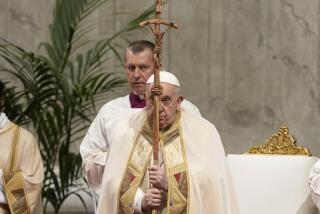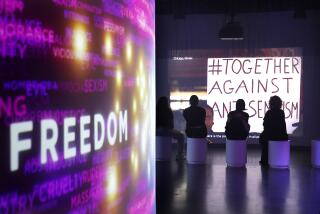Rabbi Hopes to Spread Pope’s Message of Harmony
- Share via
Departing from the widespread Jewish dismay over the Vatican’s continuing defense of its public silence during World War II, one of the area’s most prominent rabbis has invited a Catholic priest to join him tonight in urging members of his congregation to appreciate Pope John Paul II’s path toward reconciliation with world Jewry.
Before the late-evening Selichot service, which sets a repentant tone for the upcoming Jewish High Holy Days, the 1,800 families of Valley Beth Shalom in Encino were mailed part of a Vatican statement on the Holocaust issued in March.
When the statement was issued, the long-awaited document was criticized by Jewish leaders because it strongly defended the wartime pope, Pius XII. The statement also faulted Catholics under Hitler’s rule who did not protest the disappearance of their Jewish neighbors.
Rabbi Harold Schulweis of Valley Beth Shalom, in a sermon written for delivery tonight, added his lament that Pius XII “never condemned anti-Semitism by name and never declared it sinful for Catholics to take part in the slaughter,” among other passive church stances toward the Nazis.
But Schulweis praised Pope John XXIII for convening the 1963-65 Second Vatican Council, which dramatically improved Jewish-Catholic relations, and lauded John Paul II for being the first pope to visit a synagogue, for establishing diplomatic relations with Israel and for reminding Catholicism this year that the Holocaust, or Shoah in Hebrew, was the nightmare of the 20th century.
John Paul II “is to be honored for having begun a process of the ‘examination of conscience,’ ” Schulweis wrote.
The Vatican’s statement “should be regarded as the beginning of a process,” he said. “Repentance in our personal and in our collective lives is not one event or one declaration from one commission,” he added, referring to the Vatican’s Commission for Religious Relations With the Jews, which issued the statement.
The unfavorable Jewish reaction to the statement can be blamed on the “unreal expectation level” that developed over the 11 years that the Vatican commission took to release its findings, according to Msgr. Royale Vadakin, who plans to join Schulweis in tonight’s service.
“Unreal expectation does immense harm to relationships,” said Vadakin, who directed interfaith relations for the Los Angeles Catholic Archdiocese from 1971 to 1991. The priest is pastor of St. Anastasia Church in Playa del Rey.
“My hope is that all of us--especially Vatican commissions--may take deeply to heart the Torah wisdom that the pious promise little but produce much,” Vadakin wrote in remarks he plans to deliver at the service.
Nevertheless, Vadakin agreed with Schulweis that reconciliation takes time.
From the hindsight of 30 years, Vadakin said, the 1965 Vatican document on Catholic-Jewish relations was “a watershed document” that initiated innumerable interfaith dialogues and much improved understanding of each other’s faith.
“However, if you read that document again, you would find no mention of the state of Israel, no mention of proselytism, no mention of Shoah--to new readers it would seem to be ‘no big deal,’ ” he said.
That document, as well as this year’s Vatican statement on the Holocaust, should be considered not proclamations that say it all, but documents that “enable us, Jews and Catholics, to make the journey of reconciliation,” Vadakin wrote.
John Paul II is not finished, he added. Besides proposed visits to the Middle East, the pope hopes to “pronounce a formal mea culpa of Christian responsibility for anti-Judaism practices and the excesses of the Inquisition” on Ash Wednesday in 2000, Vadakin said.
Vadakin’s speaking appearance at Valley Beth Shalom will not be the first by a Catholic priest.
Cardinal Roger M. Mahony of Los Angeles spoke at a Sabbath service in the Conservative synagogue in December 1994, partly to celebrate the establishment of Israeli-Vatican diplomatic relations. Schulweis praised John Paul II at that service as “a man of compassion, conscience, vision and reconciliation.”
More to Read
Sign up for Essential California
The most important California stories and recommendations in your inbox every morning.
You may occasionally receive promotional content from the Los Angeles Times.












